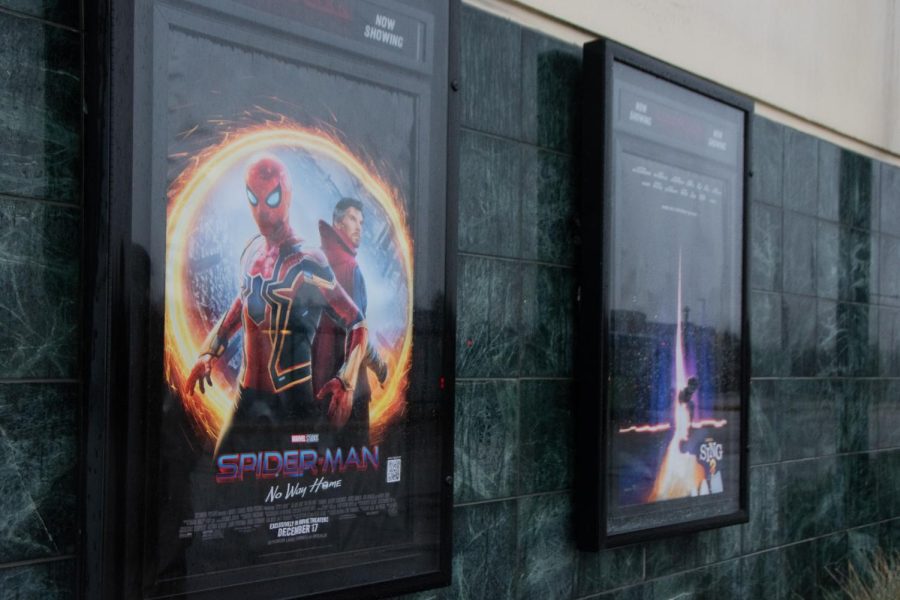“Spider-Man: No Way Home” Is More Than a Fan Film — Just Barely
“Spider-Man: No Way Home” established itself as one of the best grossing movies globally from 2021, having made $1.05 billion from around the world in less than two weeks of its initial release.
January 5, 2022
This article contains major spoilers for “Spider-Man: No Way Home.”
Picking up where his story last left off in Marvel’s “Spider-Man: Far from Home,” Peter Parker (Tom Holland) must grapple with the reality of his identity being revealed to the entire world and the consequences he — and those he loves — must face as a result of his actions in the latest installment of the web-slinger’s adventure, “Spider-Man: No Way Home.”
The film opens with the revelation of Spider-Man’s identity to the masses, something not yet explored in any of the other live-action Spider-Man films. This serves as the catalyst for Peter’s actions in the rest of the movie, as it proves to not only affect Peter and his own security but also the lives of his closest friend, Ned Leeds (Jacob Batalon), and girlfriend M.J. Watson (Zendaya), who are subsequently rejected from their colleges of choice due to their known affiliation with Spider-Man, now seen as a public enemy as a result of an incriminating edited video surfacing.
Fueled by his friends’ disappointment and the impact that their friendship with Spider-Man has had on their lives, Peter seeks out help from Doctor Strange (Benedict Cumberbatch) in an attempt to wipe any memory of Spider-Man’s identity, and turn his life and the lives of his friends back to normal — as normal as being Spider-Man and being his friends can be.
In the midst of Doctor Strange casting the mind-erasing spell, Peter realizes that those closest to him will also forget about him, and, in a hasty attempt to adjust the spell to exclude them, the spell is modified to the point of it being useless — or so they thought. Unbeknownst to the characters, the fractured spell creates a rift in their universe, forcibly bringing those who know the identity of Spider-Man from other universes into their world, including both enemies and allies.
Overall, the movie is what one would expect from a Marvel superhero film: filled with tons of exciting action sequences, relatively good visual effects, a hint of romance here and there, and humor that appeals to both younger and older audiences. But in some ways, “Spider-Man: No Way Home,” directed by Jon Watts, stands out among other Marvel movies. Its incredible attention to detail, charmingly dry humor and hilarious one-liners, and intensely emotional and relatable teenager moments all made the film one of the most enjoyable Marvel films to come out in a while.
What seemed to stand out the most, though, was the debate that the movie sparked over whether the movie itself, with its large dosage of cameos from beloved Spider-Man characters and its incorporation of a crossover between the Sam Raimi, Marc Webb, and Jon Watts Spider-Man movie universes — something fans speculated around in the months before its release — was purely to satisfy fans.
Something to note about Jon Watts’ Spider-Man series as a part of the Marvel Cinematic Universe (MCU) is that it has always maintained some form of distance from the material of the previous movies directed by Raimi and Webb — like refraining from beginning his series with Peter Parker’s iconic origin story, something both Raimi and Webb’s series utilized for their first films. Yet “Spider-Man: No Way Home” does the complete opposite, as it quite literally eliminates that distance created between the three universes as Raimi, Webb, and Watts begin flooding into MCU Spider-Man’s arena in this film, despite being characters from the films prior. So, the question now is whether or not the inclusion of this multi-dimensional storyline, which conveniently drew in characters and actors beloved by many Spider-Man fans from movies past, was merely an attempt to appease as many fans as possible or if it was a truly well-intentioned film meant to move Peter Parker along on his journey as Spider-Man.
While I think both claims are fitting for this movie, it is hard to ignore that the film is filled nearly to the brim with recognizable characters, references to iconic lines, and corny jokes and callbacks pertaining to the prior Spider-Man films that were sure to be appreciated by fans of the franchise. And these aspects of the film sometimes felt overwhelming in comparison to the actual story that felt like it may have been taking place in the background, but “Spider-Man: No Way Home” proves to be more than a film made to appease fans. And it is certainly not anything we’ve seen from a live-action Spider-Man movie before.
The liberties that Watts had previously taken with his rendition of Spider-Man were a refreshing change from what had already been done with the character’s story in the films prior, and incorporating the characters from Raimi and Webb’s respective Spider-Man series did more than simply serve long-time fans the crossover of their dreams with a hearty serving of nostalgia. It worked simultaneously to service fans while also largely developing Peter Parker’s story and the characters involved in a new and exciting way.
The new approach that “Spider-Man: No Way Home” takes with Spider-Man’s central themes, characters, and storylines gives audiences a fresh yet still familiar addition to the character’s ever-expanding story. Having Aunt May (Marisa Tomei) die and reiterate the iconic line, “with great power comes great responsibility,” instead of Uncle Ben, who has never been mentioned in Watts’ series thus far, and having the villains from both Raimi and Webb’s movies make an appearance only to have the audience see another side of them by the end are just a couple of examples of the writers taking characters and themes from previous versions of “Spider-Man” and changing them just enough to make yet another series with the same premise and main character fathomable while still including them for the anticipated effect it will have on audiences.
Yes, getting to see all three of the live-action Spider-men together was incredible, and having a lot of questions and grievances from prior films resolved was great, but these aspects of the film do not completely overpower the major character development for Peter Parker as he is not only orphaned yet again following the death of his aunt, May, but he also loses practically everyone who ever loved him by the end and is left on his own to continue his work as Spider-Man. His desire to put those he loves before himself in reversing the effects his revealed identity has on his friends, his inclination toward using his power to help save the bad guys from themselves rather than sending them to their dooms, and his ultimate sacrifice of giving up his relationships with everyone he ever loved in order to secure the sanctity of their universe is able to coexist with the obvious fan gratification the film provides, makes “Spider-Man: No Way Home” more than simply a cash grab.
With Tobey Maguire, Andrew Garfield, and Holland’s Spider-men curing each — and even full-on redeeming some — of the villains, (Garfield’s Spider-Man being able to save the girl this time around, Holland’s Spider-Man learning that his responsibility to use his power to help others in need transcends the boundaries of “good” and “evil”, and Maguire’s Spider-Man… fixing his lower back problems), the character development in “Spider-Man: No Way Home” is central to the film’s plot and also serves to resolve many of the questions and enmities fans held toward the previous writers’ decisions, which opens an entirely new question: where does Spider-Man go from here?
Watt’s ending to the third installment of his Spider-Man series seemingly ends in a somewhat satisfying place where Peter Parker, now that literally no one knows he exists, has an entirely clean slate, living alone and not having to worry about those he loves being hurt by him being Spider-Man. But Marvel has made clear their plans for another Spider-Man trilogy. Whether those plans will delve further into the “spider-verse” or even include Peter Parker at all is unclear, but either way, hopefully those next three will be able to live up to the absolute mammoth of a movie that is “Spider-Man: No Way Home.”





